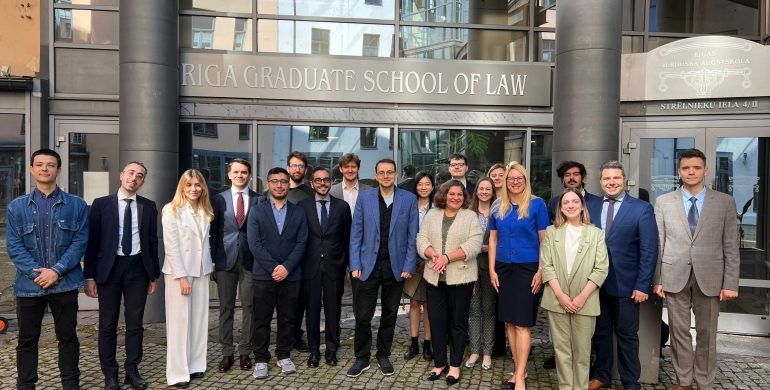Riga International Conference “European Private International Law: Is Improvement Needed?” held in Riga on June 7-8, 2025, was the first conference organised by Riga Graduate School of Law focusing entirely on private international law (PIL). More specifically, it focused on private international law embodied in European Union (EU) instruments and case law.
The conference gathered scholars and practitioners from Latvia, Lithuania, Luxembourg, Italy, Georgia, Croatia, Czechia, Austria, Belgium, China, Poland, the Netherlands, Cyprus, North Macedonia, and Türkiye.
The conference was organised by RGSL Associate Professor Aleksandrs Fillers and featured scholars from Riga Graduate School of Law, the University of Latvia, Mykolas Romeris University, the University of Luxembourg, the University of Bologna, Ivane Javakhishvili Tbilisi State University, the University of Rijeka, the University of Milan, Wuhan University, Jagiellonian University, Catholic University of the Sacred Heart, the University of Warsaw, the University of Groningen, the University of Nicosia, Afyon Kocatepe University, the Institute for Private International Law at KU Leuven, Università degli Studi di Pavia, and Ss. Cyril and Methodius University.
The conference consisted of six sessions devoted to general (fundamental) issues of EU Private International Law (PIL), the Brussels Ibis Regulation, applicable law, family and succession, and interaction between EU PIL and non-EU states. As expected, a large part of the conference was devoted to possible improvements of the Brussels Ibis Regulation – an instrument that can be seen as the pinnacle of EU private international law (PIL).
Nevertheless, the participants likewise discussed gaps and weaknesses of family and succession law instruments, the influence of EU PIL on domestic law of EU Member States and Third States, the problems of harmonising different EU PIL instruments among themselves and with the growing number of EU substantive law directives (e.g., Corporate Sustainability Due Diligence Directive) that will necessarily intersect with EU PIL.
Each session sparked an intense debate aimed at clarifying positions, often highlighting other gaps or weaknesses in EU PIL and suggesting new approaches to address them.
Overall, the conference led to a fruitful exchange of ideas on the current and future state of EU law. It is expected that the conference will serve as a starting point for a collection of articles that not only highlight identified flaws in the current EU PIL but also propose solutions for its improvement.
Conference programme available here.
Thank you to all the participants of this conference for their valuable contributions!

